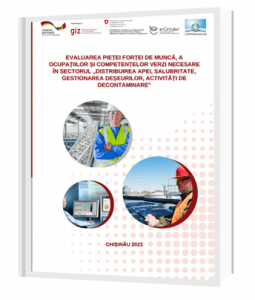For the first time for the country, under the auspices of a team of experts from the "E-CIRCULAR" Training and Consulting Center AO was realized Labor market assessment study of skills and green occupations needed in the sector "Water distribution, sanitation, waste management, decontamination activities" from the Republic of Moldova, part of the project "Promotion of VET for a green economy", implemented by the German International Cooperation Agency (Deutsche Gesellschaft für Internationale Zusammenarbeit - GIZ) within the German cooperation and co-financed by the Swiss Cooperation and Development Agency ( SDC).
Although studies on the labor market have been carried out at the national level in recent years, including the problem of the shortage of qualified labor, it is for the first time that an analysis of the DASGDAD sector (E: Water Distribution; Sanitation, Waste Management, Decontamination Activities), being considered as a key sector for a green economy. Thus, the objectives of the study consisted of:
- Analysis of relevant existing and potential new occupations required by the DASGDAD sector;
- Determining the situation in terms of human resources needs and trends in the analyzed sector;
- Analysis of labor demand and supply in accordance with labor market requirements;
- Mapping the educational offer;
- Assessing the potential for the development of green occupations and skills in this sector at national level.
The DASGDAD sector is part of the national Industry along with the extractive industry, the processing industry and the production and supply of electricity and thermal energy, gas, hot water and air conditioning. The share of this sector in the formation of the national GDP is 0.8%, the activity being supported by 607 enterprises active in this sector, of which 464 with basic activity and another 143 with secondary activity.
Unlike other sectors of the national economy, the DASGDAD sector plays a very important role in maintaining a sustainable socio-economic and environmental balance, being directly and indirectly interconnected with each of the sectors of the national economy. For this reason, the level of development, endowment and of course the quality of the skills, especially green, of the employees in the sector is directly reflected on the results of the green indicators counted at the national level (e.g. the amount of waste generated, purified water, recycled waste, etc.).
The most important resource through which the management systems are implemented in the studied field is the trained human resource who possesses skills and abilities in accordance with the specific requirements of the analyzed sector. Practically all economic agents in the field encounter difficulties in this chapter, reporting that it is difficult or very difficult to select the necessary personnel.
The research in this field shows that the notion of "green skills" is not correctly understood by many economic agents from the field and even the educational institutions that train qualified personnel for the sector. The given situation is also explained by the fact that the notion of "green skills" is a relatively new one and most of the time it is not integrated in the job descriptions of personnel trained in activities that describe the DASGDAD sector. On the other hand, the interviewed companies recognize the need for continuous development of skills/skills among its employees. Among the most important factors that considerably influence the decision of employers in this field is the implementation of CSR (Corporate Social Responsibility) - 14%, followed by the provisions of the legislation on climate change or environmental issues - 13%. To a certain extent the decision is also conditioned by the requirements imposed for carrying out the environmental impact assessment – 46 % and the introduction of new environmental standards (ISO or EMAS) – 43%. A broader presentation on the aspects that require the development of new skills/competencies in employees.
A green economy means goods and services produced with less energy, fewer raw materials and low carbon dioxide emissions. This definition applies to all economic activities and implies structural changes at the level of all sectors and occupations, with the emergence or increase in demand for new green occupations. However, the most necessary change is the "greening" of the existing ones. This means new skill sets that require updates to learning and training programs or even the introduction of new qualifications at all levels of education and training. The adoption and dissemination of clean technologies requires skills in technology application, adaptation and maintenance. Also, skills are essential for economies and businesses, workers and entrepreneurs, to quickly adapt to changes imposed by new environmental policies, the phenomenon of climate change, the scarcity of natural resources, etc.
| Each of these problems stated above are also caused by the decrease in the number of employees who have benefited from continuous professional training in recent years. According to the NBS data, there is a decrease in the expenses borne by employers for the professional training of employees. Compared to 2014, the share of expenses allocated for professional training in total employee expenses decreased by 57 %. On the other hand, we also have a weak market for continuing education services in the field and the limited offer of programs. |
Today, unfortunately, the lack of these skills is already recognized as a major bottleneck in sectors such as renewable energy, energy efficiency, waste management, water resources management, construction, environmental services, manufacturing, etc. right The study on the labor market assessment of skills and green occupations needed in the sector "Water distribution, sanitation, waste management, decontamination activities", more than 70 % of the DASGDAD sector employees are trained in the activities of the sub-sectors E36: Catchment, treatment and distribution of water and E37: Collection and purification of waste water. Although this sub-sector is largely representative of skilled labor, they do not possess sufficient skills (eg key, technical and behavioral skills) required for a green sector. The lack of these skills, in addition to outdated technologies and a modest infrastructure (e.g. 29.3% of Moldova's population is connected to a centralized sewage system, of which 64.1% in urban areas and only 2.8% in rural areas), results in unjustified losses of limited water resources in the distribution process and inadequate treatment of purified water at the national level. Two other sensitive sub-sectors analyzed are E38: Collection, treatment and disposal of waste; recovery activities of recyclable materials and E39: Decontamination activities and services, with a smaller number of employees compared to E36 and E37, but of which more than 90 % is unskilled labor.
The research carried out by this study, including the synthesis of the legal framework at the national level, confirms that although we have set more or less ambitious objectives, not all of them include green economic growth. The connection of the goals drawn with the need for green skills development and employment support in potential green sectors, as is the DASGDAD sector. Until now, in the Republic of Moldova there is no clear anticipation of professional skills or forecasts of the creation of green jobs, and the weight of the level of qualification of human capital in the analyzed sector, especially in the category of waste management, represents a major risk to the sustainability of this sector and directly the possibility of reaching the national objectives set for the following years. But even in the context where a significant proportion of the active workforce is represented by engineers and skilled workers, if workers do not continue to improve their skills and specialize, the level of basic training risks not being sufficient to ensure success. Therefore, starting from international experience in the field, it is necessary to correctly and strategically address the multitude of environmental challenges we face at the national level, namely by channeling efforts and resources to ensure key sectors such as DASGDAD with workforce sufficient, retrained with improved skills and productivity, in rhythm with technological progress, new innovations, but also in relation to demographic trends.
In this connection, investment in workforce skills should be seen as a benefit, not just a cost. |

